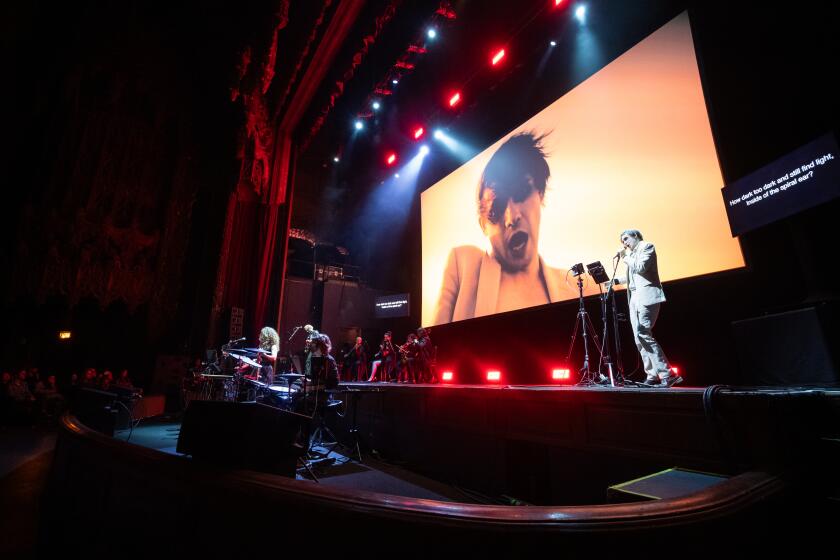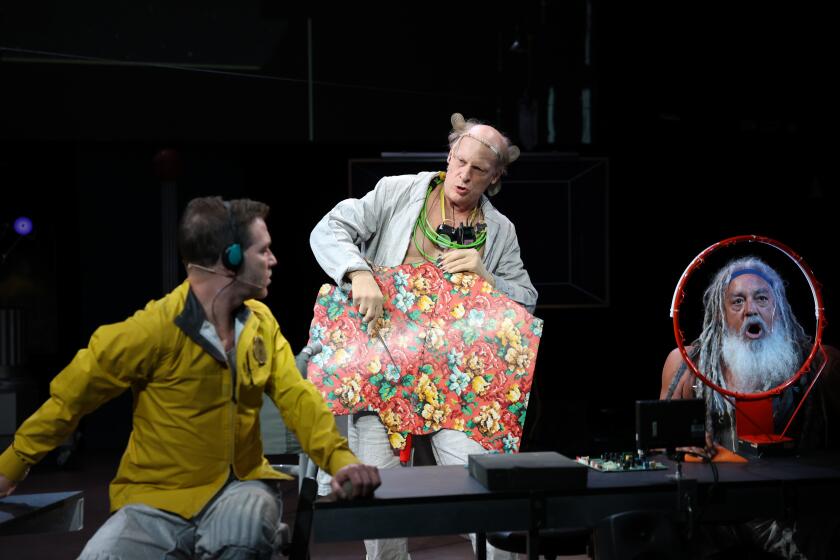Review: ‘Forever,’ a harrowing memoir with no Hollywood ending
One of the few laugh lines in Dael Orlandersmith’s harrowing new solo show, “Forever,” in its world premiere at the Kirk Douglas Theatre, comes in an exchange she describes with an attendant at the morgue after her mother’s death.
She asks him if he’s afraid. His laconic reply: “The dead can’t do nothing to you. It’s the living you’ve got to look out for.”
The wisdom of this risk assessment may appear self-evident. But for Orlandersmith — or for the version of herself she plays in these searching, brutally honest monologues — he’s got it completely backward.
An award-winning playwright, poet and actress, Orlandersmith doesn’t have a lot of trouble with the living these days. In “Forever,” she talks of being warmly welcomed at a recent party, where an attractive man approached her and discussed Chopin.
No, the one she’s got to look out for is her mother, who died in 1989 but who nonetheless retains the power to loom up out of the grave, still stinking of scotch, and make this accomplished, powerful, beautiful woman feel inadequate, ugly and dirty.
“Forever” opens in Paris. Orlandersmith is on a pilgrimage to the Père Lachaise cemetery, the final resting place of many of the artists who gave her hope during her Harlem coming-of-age: Balzac, Chopin, Colette, Modigliani, Edith Piaf and — not least — Jim Morrison.
Takeshi Kata’s bare wooden stage features podium and a chair from which Orlandersmith reads from a script and a table with a record player where she occasionally stops to spin an LP. (Adam Phalen’s sound cues are never too loud, and they fade away at exactly the right moment.)
These artists, Orlandersmith says, are the family she chose for herself, instead of the alcoholic mother who taught her about art but also abused and manipulated her. They replaced the friends she couldn’t find or keep in the ghetto.
She describes walking home from the record store with her first Doors album when a man jeered at her for listening to “white-boy … .” She persevered, rebelliously cultivating her own tastes.
This arc is familiar from Orlandersmith’s earlier solo pieces, “Beauty’s Daughter,” “Monster” and “Gimmick,” all about young black women determined to rise above bleak circumstances, who find salvation in art. But whereas in those works Orlandersmith assumed other personae, here she performs as herself, slipping only briefly into other voices during conversations she reports.
“I have not been gut-honest,” she says. “I have never spoken my mother’s name onstage: Beula.”
Is such gut-honesty necessary? Her mother has been dead more than 20 years. Hasn’t Orlandersmith, after winning an Obie (for “Beauty’s Daughter”) and being nominated for a Pulitzer Prize (for “Yellowman”), exorcised the demons of her past?
And if we, the audience, must revisit her painful history, can’t we be kidded through the hardest incidents? Is there a part where mother and daughter cry and forgive, like in the movies?
No.
Neither Orlandersmith nor her director here, Neel Keller, is interested in moving past or making light of pain, or sparing their audience the discomfort of witnessing it. “Forever” derives much of its power from the anger Orlandersmith carries and unflinchingly expresses.
And as her story makes clear, she has every reason to be angry. She was cruelly victimized, not only by her mother but by a man who broke into their house in the middle of the night and raped her — an incident she recounts in unstinting detail.
Her anger can be powerful, electrifying and cathartic. Her capacity for it may even be, as much as her love of art, what enabled her to survive.
But it can be constricting too, blinkering her to other emotions. When Beula is dying in the hospital surrounded by doting nurses (“surrogate daughters,” Orlandersmith bitterly describes them), the vengeful daughter tells her off with pitiless hatred, like a figure out of Greek tragedy.
From a theatrical perspective, unmodulated rage works best in small doses; too much of it stuns the senses. Subtler moments, as when she confesses her dreams of marrying the Irish cop who was kind to her after her rape, can be more effective.
If Orlandersmith refuses to pander to us, denying us our pat Hollywood closure, she herself embodies the hope implicit in her story. The area around the raised set has been turned into a gallery for her family photos — the originals, it looks like, with curled corners and faded color. In a few of them she’s mugging for the camera, like any kid.
With any luck, after “Forever” Beula will stay peacefully in her grave from now on and let her daughter’s spirit shine.
“Forever,” Kirk Douglas Theatre, 9820 Washington Blvd., Culver City. 8 p.m. Thursdays-Saturdays; 6:30 p.m. Sundays. Call for exceptions. Ends Oct. 26. $20-$30. (213) 628-2772 or www.centertheatregroup.org. Running time: 1 hour, 30 minutes.
More to Read
The biggest entertainment stories
Get our big stories about Hollywood, film, television, music, arts, culture and more right in your inbox as soon as they publish.
You may occasionally receive promotional content from the Los Angeles Times.










